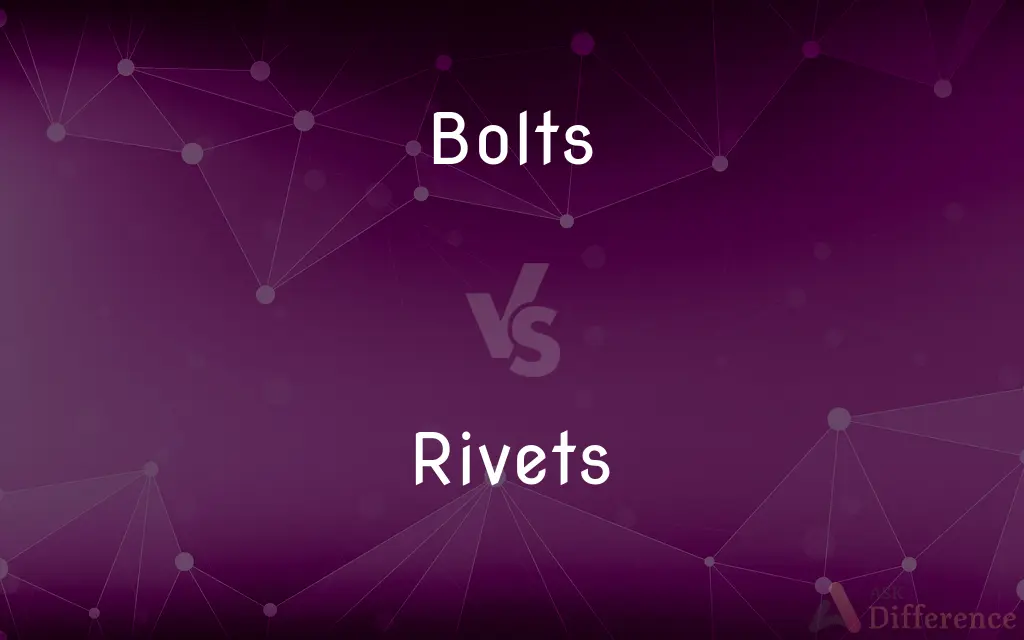Bolts vs. Rivets — What's the Difference?
By Tayyaba Rehman — Published on January 20, 2024
Bolts are fasteners that require a nut for securing, while rivets are permanent fasteners that deform to join parts and don't require a nut.

Difference Between Bolts and Rivets
Table of Contents
ADVERTISEMENT
Key Differences
Bolts are a type of fastener typically used in conjunction with a nut. They have a threaded shaft and are designed to be inserted through holes in assembled parts, secured by a nut at the other end. Rivets, in contrast, are a permanent type of fastener. They consist of a smooth cylindrical shaft with a head on one end. Upon installation, the tail end of the rivet is deformed to hold it in place, creating a permanent bond.
The use of bolts allows for the assembly and disassembly of components, making them ideal for connections that may need regular maintenance or adjustments. Rivets are used where a strong, permanent bond is required, and disassembly is not intended, such as in the construction of aircraft or bridges.
The installation of bolts is relatively straightforward, requiring a matching nut and appropriate tools for tightening. Rivet installation is more complex, requiring the use of a riveting tool to deform the tail end, which expands to hold the rivet in place securely.
Bolts can handle significant load and stress, especially when used with a locking washer or similar mechanism to prevent loosening. Rivets, once installed, provide superior strength and are less likely to loosen over time due to their permanent nature.
Bolts come in various sizes and materials, allowing for a wide range of applications in different environments. Rivets also come in different materials and sizes but are chosen based on the permanent nature of the application and the type of load they need to withstand.
ADVERTISEMENT
Comparison Chart
Type of Fastener
Requires a nut for securing
Permanent, no nut required
Usage
Assembly/disassembly, maintenance
Permanent joints, no intention of disassembly
Installation
Inserted through parts, tightened with a nut
Deformed to expand and secure in place
Strength
High, adjustable with tightening
Extremely strong, permanent bond
Applications
Machinery, construction, DIY
Aircraft, bridges, structural applications
Compare with Definitions
Bolts
A bolt is a threaded fastener used with a nut.
He tightened the bolt to secure the shelf.
Rivets
A rivet is a permanent fastener that deforms to join parts.
The aircraft's panels were fastened securely with rivets.
Bolts
Bolts require a hole and a nut for installation.
To assemble the frame, insert the bolt through the hole and fasten with a nut.
Rivets
Rivets do not require a nut to secure them.
Rivets were used in the bridge construction for their permanent bonding strength.
Bolts
Bolts can be removed and reused.
The mechanic removed the bolts to replace the car's tire.
Rivets
Rivets are used where disassembly is not intended.
The metal bench was constructed with rivets for long-term durability.
Bolts
They are used in applications requiring regular maintenance.
Bolts were used in the machinery for easy disassembly during maintenance.
Rivets
They provide a strong, permanent joint.
Rivets were ideal for the metal sculpture, ensuring a lasting bond.
Bolts
Bolts come in various sizes and materials.
For outdoor use, he chose stainless steel bolts to prevent rust.
Rivets
Rivet installation requires a special tool.
He used a rivet gun to install the rivets on the metal sheet.
Bolts
A bar made of wood or metal that slides into a socket and is used to fasten doors and gates.
Rivets
A metal bolt or pin having a head on one end, inserted through aligned holes in the pieces to be joined and then hammered on the plain end so as to form a second head.
Bolts
A metal bar or rod in the mechanism of a lock that is thrown or withdrawn by turning the key.
Rivets
To fasten or secure, especially with a rivet or rivets.
Bolts
A fastener consisting of a threaded pin or rod with a head at one end, designed to be inserted through holes in assembled parts and secured by a mated nut that is tightened by applying torque.
Rivets
To hammer and bend or flatten the headless end of (a nail or bolt) so as to fasten something.
Bolts
A sliding metal bar that positions the cartridge in breechloading rifles, closes the breech, and ejects the spent cartridge.
Rivets
To fix the attention of (someone)
The audience was riveted by the suspense.
Bolts
A similar device in any breech mechanism.
Rivets
To engross or hold (the gaze or attention, for example).
Bolts
A short, heavy arrow with a thick head, used especially with a crossbow.
Rivets
Plural of rivet
Bolts
A flash of lightning; a thunderbolt.
Rivets
Infl of rivet
Bolts
A sudden or unexpected event
The announcement was a veritable bolt.
Bolts
A sudden movement toward or away.
Bolts
A large roll of cloth of a definite length, especially as it comes from the loom.
Bolts
To secure or lock with or as if with a bolt.
Bolts
To arrange or roll (lengths of cloth, for example) on or in a bolt.
Bolts
To eat (food) hurriedly and with little chewing; gulp.
Bolts
To desert or withdraw support from (a political party).
Bolts
To utter impulsively; blurt.
Bolts
(Archaic) To shoot or discharge (a missile, such as an arrow).
Bolts
To move or spring suddenly.
Bolts
To start suddenly and run away
The horse bolted at the sound of the shot. The frightened child bolted from the room.
Bolts
To break away from an affiliation, as from a political party.
Bolts
(Botany) To flower or produce seeds prematurely or develop a flowering stem from a rosette.
Bolts
To pass (flour, for example) through a sieve.
Bolts
Plural of bolt
Common Curiosities
Can rivets be removed easily?
No, rivets are permanent fasteners and difficult to remove without damaging the parts.
What are the applications of rivets?
Rivets are used in aircraft construction, bridges, and structural applications where a permanent bond is needed.
Are bolts reusable?
Yes, bolts can be removed and reused.
Do bolts need special tools for installation?
Bolts typically require basic tools like wrenches for tightening and loosening.
What makes rivets a strong fastener?
Their permanent nature and the way they expand in the hole provide a strong, lasting bond.
What types of bolts are there?
There are many types, including hex bolts, carriage bolts, and anchor bolts.
What are bolts commonly used for?
Bolts are used in machinery, construction, and DIY projects where disassembly may be required.
What materials are bolts made from?
Bolts can be made from steel, stainless steel, brass, and other materials.
Are rivets suitable for outdoor use?
Yes, especially when made from weather-resistant materials.
How are rivets installed?
Rivets are installed using a rivet gun that deforms the tail end to secure it.
Can rivets be used in DIY projects?
Yes, but they are more commonly used in applications where a permanent bond is essential.
Can bolts handle heavy loads?
Yes, especially when properly tightened and used with locking mechanisms.
What is the main advantage of using bolts?
The main advantage is their adjustability and the ability to disassemble and reassemble.
What is a key difference in the installation of bolts and rivets?
Bolts require a nut for securing, whereas rivets are deformed to hold them in place.
Are bolts and rivets used together?
They can be used together in some applications, but they serve different purposes.
Share Your Discovery

Previous Comparison
Followers on Instagram vs. Following on Instagram
Next Comparison
Hilton vs. Holiday InnAuthor Spotlight
Written by
Tayyaba RehmanTayyaba Rehman is a distinguished writer, currently serving as a primary contributor to askdifference.com. As a researcher in semantics and etymology, Tayyaba's passion for the complexity of languages and their distinctions has found a perfect home on the platform. Tayyaba delves into the intricacies of language, distinguishing between commonly confused words and phrases, thereby providing clarity for readers worldwide.














































